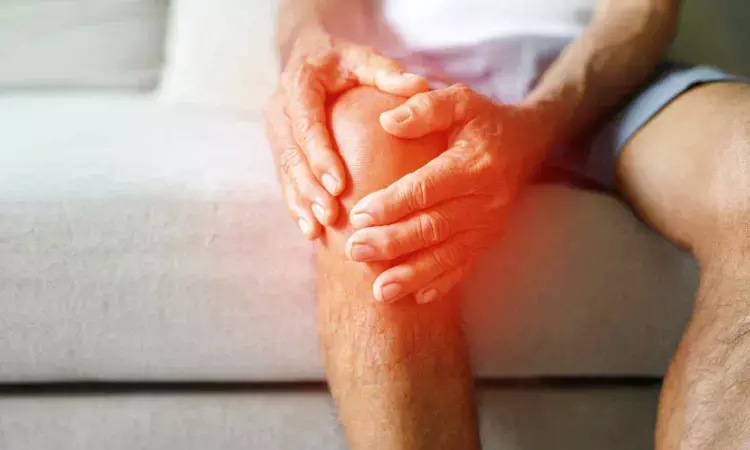- Home
- Medical news & Guidelines
- Anesthesiology
- Cardiology and CTVS
- Critical Care
- Dentistry
- Dermatology
- Diabetes and Endocrinology
- ENT
- Gastroenterology
- Medicine
- Nephrology
- Neurology
- Obstretics-Gynaecology
- Oncology
- Ophthalmology
- Orthopaedics
- Pediatrics-Neonatology
- Psychiatry
- Pulmonology
- Radiology
- Surgery
- Urology
- Laboratory Medicine
- Diet
- Nursing
- Paramedical
- Physiotherapy
- Health news
- Fact Check
- Bone Health Fact Check
- Brain Health Fact Check
- Cancer Related Fact Check
- Child Care Fact Check
- Dental and oral health fact check
- Diabetes and metabolic health fact check
- Diet and Nutrition Fact Check
- Eye and ENT Care Fact Check
- Fitness fact check
- Gut health fact check
- Heart health fact check
- Kidney health fact check
- Medical education fact check
- Men's health fact check
- Respiratory fact check
- Skin and hair care fact check
- Vaccine and Immunization fact check
- Women's health fact check
- AYUSH
- State News
- Andaman and Nicobar Islands
- Andhra Pradesh
- Arunachal Pradesh
- Assam
- Bihar
- Chandigarh
- Chattisgarh
- Dadra and Nagar Haveli
- Daman and Diu
- Delhi
- Goa
- Gujarat
- Haryana
- Himachal Pradesh
- Jammu & Kashmir
- Jharkhand
- Karnataka
- Kerala
- Ladakh
- Lakshadweep
- Madhya Pradesh
- Maharashtra
- Manipur
- Meghalaya
- Mizoram
- Nagaland
- Odisha
- Puducherry
- Punjab
- Rajasthan
- Sikkim
- Tamil Nadu
- Telangana
- Tripura
- Uttar Pradesh
- Uttrakhand
- West Bengal
- Medical Education
- Industry
Noisy knees not an early arthritis sign in young people, research shows

Young adults who experience grinding or clicking sounds in their knees post-surgery may be alarmed, but new research from La Trobe University suggests these sounds may not signal early-onset osteoarthritis.
Knee crepitus, the sound of cracking or grinding in the knee joint is very common across all age groups. The study, published in the Arthritis Care & Research journal, followed 112 young adults after anterior cruciate ligament (ACL) reconstruction, using Magnetic Resonance Imaging (MRI) scans and patient-reported outcomes to track osteoarthritis signs over five years.
La Trobe graduate researcher and physiotherapist Jamon Couch said that while knee crepitus was linked to cartilage damage and worse symptoms one year after surgery, it did not predict joint damage over time.
“We found that those with knee crepitus demonstrated more than two and a half times greater rates of full-thickness cartilage defects in the kneecap area, with more pain and poorer function early on,” Jamon said.
“But over the next four years, those with crepitus did not experience worse pain and function compared to those without knee crepitus.”
Research shows about 50 per cent of people with an ACL rupture will develop osteoarthritis symptoms and structural changes within a decade of injury, nearly 15 years earlier than the uninjured.
The findings challenge the idea that crepitus should be used to diagnose or predict early osteoarthritis following traumatic knee injury in young adults.
Dr Adam Culvenor, head of the Knee Injury Research Group at La Trobe’s Sport and Exercise Medicine Research Centre (LASEM) said the research would be reassuring for younger patients worried that noisy knees may be a red flag signalling their joint was deteriorating after surgery.
“It also highlights the importance of staying active and engaged in rehabilitation to avoid or delay osteoarthritis,” Dr Culvenor said.
The researchers say the study supports a more nuanced approach to diagnosing early-stage osteoarthritis and encourages health professionals to avoid overinterpreting crepitus in young, active patients.
Reference:
Jamon L Couch BHlthSc, MPhysioPrac, Knee crepitus and osteoarthritis features in young adults following traumatic knee injury, Arthritis Care & Research, https://doi.org/10.1002/acr.25637
Dr Kamal Kant Kohli-MBBS, DTCD- a chest specialist with more than 30 years of practice and a flair for writing clinical articles, Dr Kamal Kant Kohli joined Medical Dialogues as a Chief Editor of Medical News. Besides writing articles, as an editor, he proofreads and verifies all the medical content published on Medical Dialogues including those coming from journals, studies,medical conferences,guidelines etc. Email: drkohli@medicaldialogues.in. Contact no. 011-43720751


